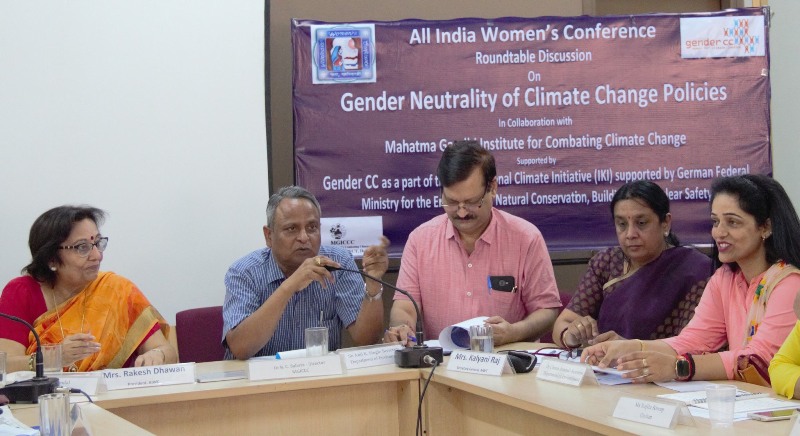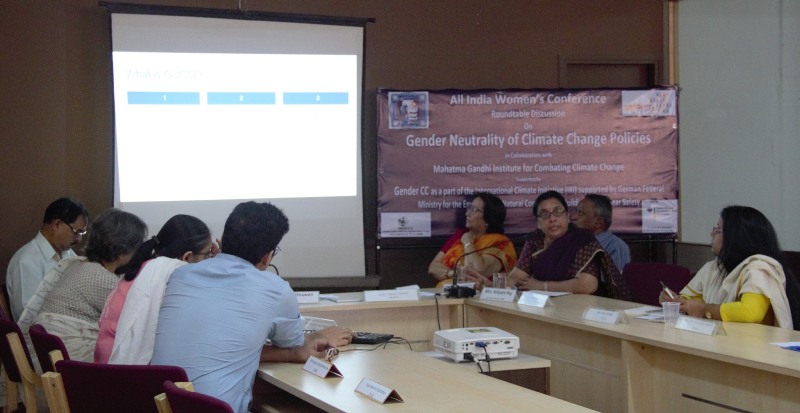All India Women’s Conference (AIWC), on 15th May, organized a roundtable consultation on ‘Gender Neutrality in Climate Change Policies’. With the overarching aim of closing gender gaps and exploring options for integrating gender and social issues into urban climate change policies, AIWC in collaboration with Gender Climate Change (CC), Germany, has initiated the ‘Gender into Urban Climate Change Initiatives’ (GUCCI) project in Delhi. Impact of climate change is already being felt across the globe by multiple marginalized groups, including women, and their disparage social conditions critically add to the problem by limiting the coping mechanisms of women. The Asian Cities Climate Change Resilience Network (ARCCCN) project in seven Asian Countries, including India, has clearly indicated that gender mainstreaming in climate change policies is able to promote not only empowerment across gender but also achieve sustainable development. Gender mainstreaming is not yet an essential issue in the policy discourse of India. However, the existing challenges faced by multi-vulnerable groups create an urgent need for its acknowledgment and awareness generation of climate compatible policies and programmes. In this regard, the objectives of this roundtable consultation can be summarized as follows:
1) Need for gender mainstreaming in climate policies
2) Identifying most important entry points into climate change policies
3) Formulate a mechanism to institutionalize gender mainstreaming in Delhi’s climate policy framework.


Ms. Kalyani Raj, Secretary General, AIWC, began with a short introduction of the GUCCI project, which began in India in 2016, and is currently ongoing in the Delhi and Mumbai. Additionally, on an international scale, this project has also been initiated in Indonesia and South Africa. The findings of their pilot study in Delhi indicates that urban spaces in Delhi are increasingly being occupied by migratory population, and thus the need for gender mainstreaming in climate change policy framework is necessary. The study used the analytical framework of Gender Assessment Method for Mitigation and Adaptation Policies of Climate Change (GAMMA) and were quick to point out that adaptation is more challenging than mitigation because not all concerns are climate change related, but primarily environmentally oriented. Given women’s key role in household decision-making, it was reiterated that gender mainstreaming should be done with the larger aim of intensifying their decision-making abilities. Furthermore, it should be acknowledged that women use certain traditional techniques to combat climate change, and the component of gender mainstreaming should take this forward. In Delhi, the multi-governance structure of the city is a challenge to effectively implement mitigation and adaptation policies. Ms. Raj also cited the case of AIWC’s initiative in Kerala, wherein under the aegis of the programme ‘Energy Training’, women would go from door-to-door, and disseminate expert knowledge on how to reduce a household’s electricity bill. The local government has recognized this initiative and is keen to join hands with AIWC to make it a more formalized mechanism.
Ms. Rakesh Dhawan, President of AIWC, added that those impacted with climate change have contributed much less to it, and that we should not copy the mistakes of the West in addressing this issue. Instead, traditional methods should be developed and modified, and that, essentially, would constitute a radical shift in terms of action.
There were various sessions held during the event, some of them being:
1) Gender and Draft Climate Change Action Plan
2) Status of Delhi Action Plan on Climate Change and Scope of Gender Integration
3) Dealing with Gender Neutrality of Climate Change Policies
4) Prioritizing Specific Areas of Intervention of Gender Mainstreaming for Climate Policy


The roundtable consultation also saw the participation of other members of the civil society and NGOs who raised pertinent concerns and suggestions in front of the panel. These include-
1) Traditional systems in smaller communities should be revived, in order to facilitate bottom-up change.
2) There ought to be a third-party verification of the comments and inputs provided to the government to ensure transparency and accountability
3) Government can ensure implementation of gender mainstreaming in climate change policies by fostering women’s decision-making power- a component many NGOs are working towards.
4) Oftentimes, government replies with the number of schemes it has launched to address the climate crisis, but monitoring of these schemes is insufficient. Therefore, civil society can act as a watchdog which ensures continuous monitoring and evaluation.
Ayurshi Dutt, who represented Centre for Social Research, had the following impressions regarding the event :
“The overarching idea of the All India Women’s Conference on 15th May 2018 was to promote gender mainstreaming in climate change policies. The development discourse has mostly integrated the West’s resolutions to combat climate change, but one of the key messages of this event was not to repeat the mistakes of the West. Instead, countries of the global South must tap into their indigenous and traditional methods to respond to climate change. It should not be forgotten that those who contribute least to the exacerbation of climate change, are the most vulnerable recipients of this phenomenon. Therefore, in order to have a sustainable response, women’s specific gender-based contributions should not be forgotten and their integration into the policy discourse thus becomes imperative.
The ongoing ‘Gender into Urban Climate Change Initiatives’ project in New Delhi also saw participation by the Government of Delhi, and it was an interesting revelation that this is the first time a gender expert has been hired by the Ministry of Environment, Forest and Climate Change. Universities and academic institutions in the capital city, affiliated with the Department of Environment of Delhi, were also key panellists and demonstrated the work undertaken by their institutions to enhance sustainable practices. Mahatma Gandhi Institute for Combating Climate Change was one such institution wherein female waste-pickers were being educated about the importance of waste segregation. School of Planning and Architecture representatives deliberated that certain policies run parallel to each other in the context of climate change, predominantly with respect to air pollution. There is a need to revive traditional systems in smaller communities which will in turn facilitate a bottom-up change.
Members of the civil society were also present and signposted many critical junctures which may be sidelined by the government. For instance, NGOs are proactive in submitting suggestion and feedback to governments regarding newly-minted policies, however, there is no system in place which checks whether these concerns have been acknowledges, therefore, a third party verification would be ideal. Secondly, in the context of urban spaces, we often forget the divide between urban rich and urban poor, and further within, urban rich men and women, urban poor men and women. Adaptation and mitigation policies should also be in the context of water usage and electricity usage wherein women play a key role in terms of decision-making, thus providing an arena to tap into. Potential entry points for the government and policymakers to integrate gender into climate change policy were to look at the gaps in the existing Action Plans, and administer efficient vulnerability assessments. In doing so, a sectoral and socio-economic demographic data will be produced generating qualitative and quantitative information to policymakers.”




